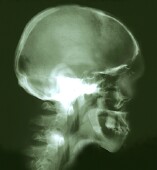- The Best Time of Day to Drink Bone Broth to Maximize Health Benefits
- 8 Ways to Increase Dopamine Naturally
- 7 Best Breads for Maintaining Stable Blood Sugar
- Gelatin vs. Collagen: Which is Best for Skin, Nails, and Joints?
- The Long-Term Effects of Daily Turmeric Supplements on Liver Health
- Could Your Grocery Store Meat Be Causing Recurring UTIs?
- Are You Making This Expensive Thermostat Error This Winter?
- Recognizing the Signs of Hypothyroidism
- 10 Strategies to Overcome Insomnia
- Could Artificial Sweeteners Be Aging the Brain Faster?
Anti-Seizure Drug May Guard Against Some Cancers


A drug used to treat seizures may reduce the risk of head and neck cancers, a new study suggests.
Valproic acid (Depakote) is prescribed to prevent seizures and also to control mood, but it is also being investigated for cancer prevention because it inhibits genetic changes that can lead to cancer.
The new study included nearly 440,000 U.S. veterans, including about 27,000 who were taking valproic acid for bipolar disorder, post-traumatic stress disorder (PTSD), migraines and seizures. Overall, veterans who took the drug for at least one year were 34 percent less likely to develop head and neck cancers than those who didn’t take the drug, the investigators found.
The risk appeared to be even lower in those who took it in higher doses or for longer periods of time, according to the study published online March 24 in the journal Cancer.
Veterans who took valproic acid did not have a reduced risk for lung, bladder, colon or prostate cancers, said team leader Dr. Johann Christoph Brandes, of the Atlanta Veterans Affairs Medical Center and Emory University in Atlanta, and colleagues.
“A 34 percent risk reduction for the development of head and neck cancer with [valproic acid] use could result in the prevention of up to approximately 16,000 new cases and 3,000 to 4,000 annual deaths in the U.S. alone,” Brandes said in a journal news release.
“Head and neck cancer is an important global health crisis, and low cost and low toxicity prevention strategies like [valproic acid] use have a high potential impact on pain, suffering, costs, and [death] associated with this disease,” he added.
Although the study found an association between valproic acid use and reduced risk of certain cancers, it did not prove cause-and-effect.
More information
The U.S. National Cancer Institute has more about head and neck cancers.
Source: HealthDay
Copyright © 2026 HealthDay. All rights reserved.










